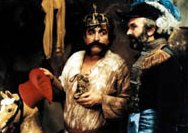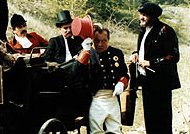 |
Vol 0, No 13
21 December 1998 |
|
|
 K I N O E Y E:
K I N O E Y E:A Czech Fairy-tale on Tour Oldrich Lipsky's Tri veterani Andrew James Horton Oldrich Lipsky with his Tri veterani (Three Veterans, 1983) shows that the genre of the fairy-tale has not died in importance for the Czechs since Borivoj Zeman's film (see the accompanying article on Byl jednou jeden kral, As Camp as Christmas). Indeed, the film was able to attract some big names to take part in the film, including master animator Jan Svankmajer and the big-name actors Petr Cepek (Obecna skola [Elementary School], Faust) Rudolf Hrusinsky (who has appeared in over 100 films dating back to the 1940s including Skrivanci na niti [Larks on a String] and Obecna skola) and Josef Somr (Ostre sledovane vlaky [Closely Observed Trains]). More than this the film has connections with the biggest name of them all in Czech fairy-tale terms, having been based on a story by Jan Werich. Although UK audiences will, for the time being, be denied the opportunity to see Zeman's film, Tri veterani is one of five films which will soon be touring the UK as part of a Czech film season, organised by the Czech Centre in London. The festival is set to travel to Glasgow, Edinburgh, Belfast, Bradford, Nottingham, Stoke, Sheffield, and Norwich early in 1999. With the war over, Pankrac, Servac, and Bimbac (named after the three "ice saints", whose days fall in succession around the period of the first frosts) are left to enjoy an impoverished retirement. Roughing it in a wood one night, the three all wake up at separate times from each other. Once roused, they each meet one of three dwarves on their way to the nose tree to meet up with each other. The dwarves give them a present: a hat which can conjure up any object for Pankrac; a bag of endless coins for Servac; and a lyre which can summon any number of men for Bimbac. Delighted, the three set off to use their new magic toys. Bimbac, who in his heart is still a soldier, uses his lyre to re-enact battle scenes for his delight. The others soon detect a worryingly megalomaniac streak in him and wonder what they can do to constrain him. The best solution, they come to the conclusion, would be to marry him off and so off they set in search of the ideal woman, who, they conclude should be "half angel, half bitch."
They miscalculate, though, and Bosanna seems to be rather too much of a bitch. The impoverished royalty steal the magic objects and the veterans are lucky to escape from the country with their lives. They barely make it back home across the mountains and when they do they are left with the problem of how to recover the magic items. Fortunately, they are able to find the nose tree and the adventures begin anew. Improbable a recommendation as it may seem, Tri veterani is worth seeing. There are some great one-liners ("Of course something's up, something's always up, otherwise we wouldn't have any history.") and it delights in a way that other Western fairy-tales cannot - only the Czechs could have a stuffed ancestor with moving eyes and a magic hat which produces Camel cigarettes and hot toddies on demand. Tri veterani is a pleasing antidote to the simplistic fairy-tales of Disney. Unlike in their American counterparts, no Czech fairy-tale would ever forget to have some bite to it and Tri veterani is full of sharp satire and social commentary in a way that Disney could never dare attempt. The characters have more depth; the heroes have their faults and villains are, in their own way, loveable. Somehow along the way, the Americans seem to have forgotten that the function of fairy-tales is more than just to entertain us. They should be moral tales which show human failings and what happens as a result of them. They are meant to shake us more than they are to lull us into a sense of security from a cheap set of cinematic values or lead us to believe that we all lie on one side or other of some chasm which divides good from evil. More than this, though, Tri veterani continues the great tradition that children's stories should have just as much to say to adults. Andrew James Horton, 21 December 1998 CER would like to thank Czech Television for the photographs in this article.
|
|
![]()
Copyright © 2000 - Central Europe Review and Internet servis, a.s.
All Rights
Reserved
All Rights
Reserved
 Their travels take them to the distant country of Monte Alba, a ludicrously Orientalised place, with everyone dressed in wild pantomime Eastern costumes. Despite all this Asian camp, the place is a thinly disguised parody of a dilapidated Czech village. Here in this land where the spiders are lazy and the people are poor, they meet Princess Bosanna who seems to have just the right angel/bitch ratio in her to be right for marrying Bimbac. Not only that, she is, as befits a princess, stunningly pretty.
Their travels take them to the distant country of Monte Alba, a ludicrously Orientalised place, with everyone dressed in wild pantomime Eastern costumes. Despite all this Asian camp, the place is a thinly disguised parody of a dilapidated Czech village. Here in this land where the spiders are lazy and the people are poor, they meet Princess Bosanna who seems to have just the right angel/bitch ratio in her to be right for marrying Bimbac. Not only that, she is, as befits a princess, stunningly pretty.